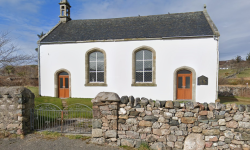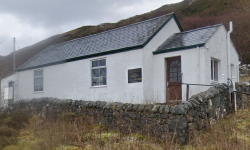Rob Donn Calder or Mackay, Strathmore
Donald Sage wrote the following in Memorabilia Domestica:
The most distinguished of the Mackays of that age was Rob Donn the poet. This unlettered, but highly-gifted, individual was born in the year 1714, at Allt na Caillich, Strathmore, parish of Durness. From his early years, his rich and original poetic vein was strongly exhibited. His poetry was the plant, not improved and cultivated, but in its natural state, in its first growing soil, in wild and inimitable simplicity. Even Burns himself, high as his claims are, must yield to Rob Donn. Burns and all his great poetic compeers could read and rightly estimate the poetry of others. Rob Donn could neither read nor write. He stood alone. With a poet’s eye he looked into the face of nature. Nature in its fairest or in its most abject forms, whether animate or inanimate, rational or irrational, was at once his theme and his study. In his poetry there is a variety of subjects embracing all the incidents of common life. His poetry is history – a history of everyone and everything with which he at any time came into contact in the country in which he lived. His descriptions do not merely let us know what these things or persons were, but identify us with them; we behold them not as things that were, but as things that are. They are all made to pass in review before us, in their characters, and language, and peculiarities, and habits. His Elegies open a fountain of sadness. They bring us to the house of mourning, they place us by the dead man’s bed, and compel us to feel a sinking of heart in sympathy with every member of the family at the breach that has been made. His love songs are chaste and inimitably tender. In his satires every vulnerable point, whether a moral deformity or a bodily defect, is seized upon, laid bare, and subjected to the lash, every stroke of which draws blood, and not one of which misses its aim. Unlike many poets of eminence, he is the advocate of religion. Then and for many years after his death, the only library in which his poems were to be found was the memory of the people. When he composed a song, he no sooner sang it than, with all the speed of the press, it circulated throughout the country. An edition of his poems was published in 1829, under the revision of Dr. Mackay of Dunoon; but it is singularly defective. The editor was anxious to give Rob Donn universal publicity in the Highlands by correcting his Gaelic; but being, unfortunately, no poet himself, he, in his attempts to improve the poet’s Gaelic, has strangled his poetry. My father, when schoolmaster of Tongue, met with the poet. He invited him to dinner, an invitation which was accepted. The poet was pleased with his fare and still more with his host, and, at parting, offered to make his entertainer the subject of a poem. This offer my father declined, aware of those high powers of satire with which his guest was endowed, and which, like a razor dipt in oil, never cut so keenly as when intermingled with compliment and praise. Rob Donn died in 1778, at the early age of sixty-four. A monument of polished granite was, by subscription, erected to his memory in 1829, in the churchyard of Durness, his native parish. A monument far more in keeping with the originality and simplicity of his character was placed upon his grave by his surviving friends soon after his decease—a rude, unpolished slab, containing no other inscription than the two emphatic words “Rob Donn.”
One of his most famous compositions, Ewen’s Elegy, reflects on the solemnity of death – its certainty and universality and the need to be prepared for it. John Mackay of Montreal has given the background to this notable work which he also translated [Rob Donn, TGSI vol 5:81-97.]
Rob was benighted on a deerstalking expedition, near the head of Loch Eriboll, and took shelter in a hut belonging to an old man named Ewen, whom he found stretched on his pallet, apparently at the point of death. He had heard that morning of the death of Pelham, then Prime Minister to King George the Second. The idea of his death, called away from the summit of ambition and worldly greatness, contrasted with poor Ewen’s state, set him to the invoking of his muse.
‘Tis thou that dost instruct us Death!
That we should learn ere yet too late
The longest lives are but a breath—
Thou callest hence both small and great!
But these thy latest actions, make
Us ope’ at once our slumb’rous eyes–
Thy sudden leap from Britain’s Court
To this low nook where Ewen lies!
Long time, O Ewen, yes long time,
Has dread disease foretold thy fate,
Now nigh Death’s door dost thou repine,
With no one to compassionate!
If unimprov’d the time has pass’d,
And many a crime been done therein,
Yet hope remains while life shall last,
Oh! yet repent thee of thy sin!
If we believe thy word, O Death,
These lessons we shall ne’er let slip ;
There is no mortal drawing breath
Too vile for thy companionship!
This solemn truth when will we learn,
Death’s vision is both high and low-
From Ewen’s sores thou dost not turn-
Great Pelham felt thy mortal blow!
Long time, O Ewen, yes long time.
Thou makest grief in Court and Hall,
When at thy touch Earth’s glories fade!
The ragged poor man thou dost call,
For whom no mourning will be made!
All men, O Death, thy face shall see,
And all be forced with thee to go!
Watchful and ready should we be,
‘ Twixt Pelham high and Ewen low!
Long time, O Ewen, yes long time,
And all around thy victims fall,
Unseen thy sudden bullets fly;
The voices round us loudly call
That we should be prepared to die.
Thou that art lowest in the throng,
Hast thou not heard that Ewen dies?
And thou by God made great and strong
That low in dust great Pelham lies?
Long time, O Ewen, yes long time.
Friends of my heart! And shall not this
Make all our thoughts to heaven tend?
Society a candle is
That flames away at either end!
In Scotland, where’s a humbler man,
O Ewen, than thy father’s son?
And in all Britain, greater than
This Pelham, save the King, was none!
Long time, O Ewen, yes long time.
George Morrison a young poet from Ardbeg (Loch Laxford) in Eddrachillis, composed the following elegy on the day after, Rob Donn’s death.
O you were the man of ablest mind
Beyond question of this generation.
Considering the opportunities open to you,
Where has greater excellence been heard of?
Amongst your outstanding talents
You were endowed with the bardic gift—
A mouth that composed and sang
Poetry most beautifully.
Poverty did not seduce you
To turn aside from the light,
And fear did not restrain you from speaking
When the truth was your concern.
No other man excelled you
In praising the meritorious:
But when you dispraised,
That was when the wicked trembled.
Sorrow and yearning have descended on us
Now you have gone from us to the grave,
You who were so sure of aim and wise;
Great was your worth throughout the land.
Because nature was so bountiful to you
With her gifts of understanding and intelligence,
Teachers and rulers received
Guidance from your judgments.
Scotland’s poet of good sense,
Greatest of elegists,
The treasures of your mind may be read
In every song of yours that is sung.
I cannot say in your praise
Half of what you have merited,
Since you cannot be raised from the grave
To give me better guidance.
It would be my wish that the means
Followed to preserve the memory of you
Would be to have your songs written
And set down in print.
Then, when they are read,
Excellent and incisive as they are,
Competent judges would
Pay you your due in worthy tributes.
When the gentry of the sheriffdom
Gathered together with their retinue,
Part of their desire and their joy
Was to have you as one of their number.
A modicum of your good sense
Would displace the music of strings for them—
Although now you lie low
In the mould’s house of forgetfulness.
This translation is given in Ian Grimble, The World of Rob Donn, Edina Press, 1979. George Morrison, who Rob Donn considered something of his successor, was drowned off the coast of Thurso while still a young man.
The influence of Rob Donn in Durness and the surrounding parishes was great. During his own lifetime that influence appears to be almost universally positive in encouraging moral behaviour and neighbourliness and exposing hypocrisy, not only by his poetry but also his personal example. He was made an elder in the Durness congregation before his death. However, some years after his death, it was not the religious and moral influence of his poetry and person so much that seems to have endured in the parish, but rather a desire for the poets works as entertainment – his songs, accompanied by the bagpipes, became something of a Nehushtan. Eric Findlater wrote that his father, Rev William Findlater, who had himself, along with his sister-in-law, done much to preserve Rob Donn’s compositions in writing, was of the opinion that “Rob Donn’s songs had just done the harm to Durness which those of Burns’ did to Ayrshire.”

